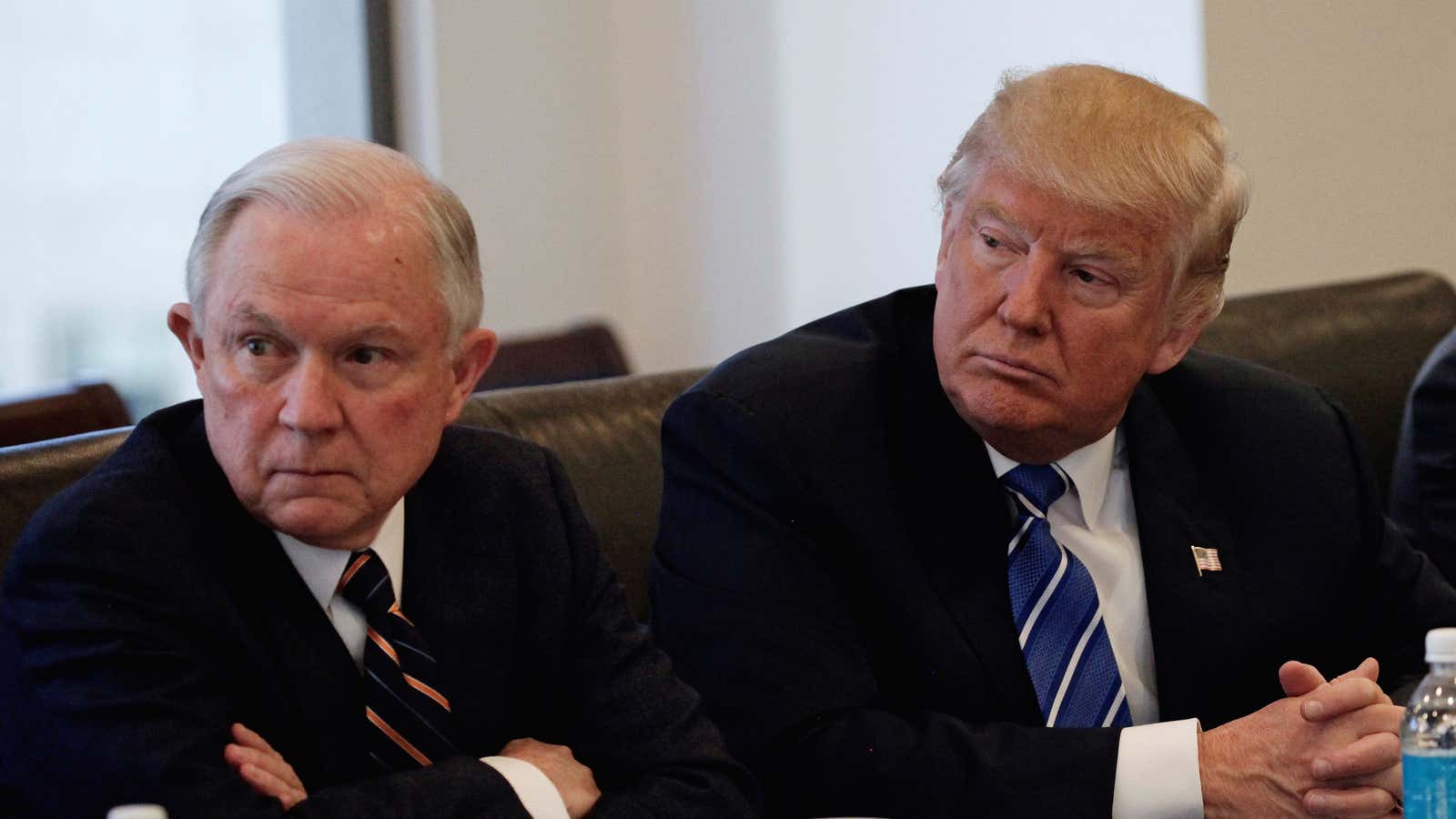The predominant visa program utilized by Silicon Valley tech companies to source top talent abroad may be in a precarious situation after the election of Donald Trump to the US presidency earlier this month. Although the president-elect has held vacillating positions on the topic on the campaign trail, his proposed appointment of Alabama senator Jeff Sessions to the office of US Attorney General sends a clearer signal.
Sessions is a longtime, vocal critic of the H-1B visa program, which admits roughly 65,000 skilled workers and 20,000 graduate students to the US annually, many for employment in the tech sector. And his legislative record suggests, as head of the Department of Justice and chief lawyer for the US government, he would seek to significantly curtail the number of H-1B visas available and likely formulate new criteria that would make it more difficult for applicants and US employers to obtain them.
Twice in 2015, Sessions sponsored bills that sought to clip the wings of the H-1B. The American Jobs First Act, co-sponsored with Texas senator Ted Cruz, raises the bar with regards to credentials for H1-B recipients—employees would be required to have doctorates, or a master’s degree with at least 10 years of non-academic experience. Additionally, US employers would have to demonstrate that no equally qualified American citizen could fill the role. The Act also stipulates stricter compliance measures for US employers and heightened penalties for non-compliance.
The second proposed bill, the Protecting American Jobs Act, was co-sponsored with Democrat Bill Nelson of Florida, called for reduction in the number of annual H-1B visas by about 15,000.
Sessions roots his reasoning against the H-1B in a kind of educational policy. Policies that expand the supply of guest workers discourage US students from pursuing STEM studies and lucrative jobs in tech, he said in an address to the Senate in 2014. But at its core, his argument is classically nativist: “The share of the population today that is foreign-born has quadrupled … After four decades of large-scale immigration, is it not time, colleagues, that we slow down a bit, allow wages to rise, assimilation to occur, and the middle class to be restored?”
Specific motivations aside, his appointment has some Silicon Valley professionals concerned. The restrictive H-1B measures entailed by Sessions’s proposals could substantially impede firms’ ability to source unique talent from overseas—something that has become a staple of the industry, of sorts.
“They would be left with a vacuum where they would not be able to meet their hiring needs,” explains Jennifer Y. Lee tells Quartz. Lee, a Bay Area attorney who specializes in immigration and nationality law, works with a number of clients in the tech field. Sessions’s measures “presuppose that such hiring vacuums could be filled with a ready supply of American tech workers who are both qualified to do the job and wiling to work in the geographic areas where the hiring vacuums appear,” she says.
It’s in this chicken-and-egg scenario that nativist politicians and Silicon Valley have found their sticking point. In Sessions’s mind, overseas hiring practices discourage American workers from pursuing STEM educations and subsequent careers. For those in the tech field, it’s precisely because fewer Americans are pursuing STEM that talent must be sourced from overseas.
“We absolutely need to invest, as a country, in developing US tech talent and up-skilling portions of our labor force,” says Brynne Herbert, CEO and founder of MOVE Guides, a company that assists HR teams relocate employees transnationally. “However, the benefits of a diverse labor pool are not only about skills—but also in the cross-cultural understanding, varying perspectives, and global networks that come from diversity in backgrounds and nationalities.” Herbert says her clients in the tech field are just as interested in these qualities, which foster innovative approaches to risk-taking and problem-solving, as they are in hiring the best people, passport regardless.
She points to a report compiled by the National Foundation for American Policy which found that more than half of US technology startups are founded by immigrants; valued at at least $1 billion. “Looser immigration policies are the greatest form of economic empowerment for individuals,” she notes. “We see this need in our customer base—both technology companies and Fortune 500 companies—and I do hope the new administration does not inhibit company growth.”
